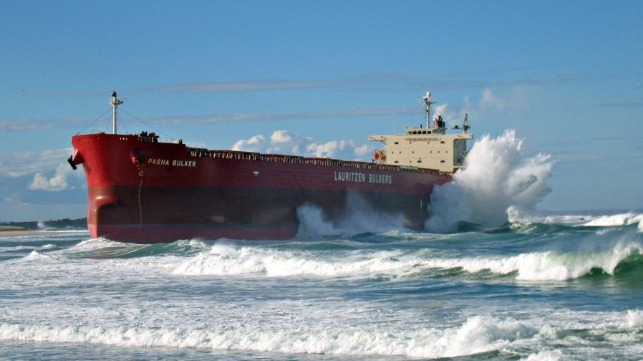Learnings from the Preventable Grounding of MV Pasha Bulker

Three separate root causes led to MV Pasha Bulker running aground at Newcastle, Australia, on June 7, 2007. She had been at anchor about 2.5 nm off the coast, waiting to load coal, when a violent storm with 50 knot winds passed through. She dragged her anchor, and attempted to sail but was unable to make way through the water or hold steerage. She grounded on Nobby's Beach at 0950 after a protracted fight to control the vessel, leaving a spectacular hull fetched up on the beach for over three months.
Cause 1: Weather warnings unheeded
There were 56 ships at anchor when the weather deteriorated around 0200 on June 7. By 0400, 16 had departed, and by 0700 only 9 remained, including Pasha Bulker. All vessels eventually put to sea, but three had serious difficulty manoeuvring. The master of Pasha Bulker later stated he had faith in the holding power of his ship. He laid out extra anchor cable, but this had little effect. Had the warnings been heeded earlier, Pasha Bulker (and others) may have put to sea much earlier, before the situation became so dire.
Cause 2: State of ballast
Because Pasha Bulker was waiting to load, she was in a light-ballast condition (she was not holding much ballast water onboard - and ballast water adds mass). That means she was 10-20,000 tonnes lighter than usual, and sat higher in the water. In turn, this means her propellor and rudder were not sufficiently submerged, particularly while pitching. During the gale, her propellor repeatedly broke the water, rendering it ineffective. After Pasha Bulker weighed her anchor, intending to steam to sea, the ship could not gain propulsion or steering during the storm - meaning she had no navigational control over steerage or propulsion. Had the officers recognized the precarious state of ballast, Pasha Bulker may have flooded her ballast tanks, deepened her draft, decreased her windage, and immersed her propellor and rudder.
Cause 3: Inability to deploy anchors
At 0650, Pasha Bulker started dragging anchor about 2.3 nm from the coast. She weighed anchor at 0710, and by 0748 she had closed to 1.2 nm from shore. By 0845 (1 hr before grounding) the vessel was not under control and rolling up to 43 degrees (a treacherous state of roll). Winds were gusting to 50 knots, and it was unsafe for the crew to proceed to the bow to deploy the anchors. Had the vessel been able to let go her anchors, she may have had holding power to slow her closing the coast, take on ballast, and gain propulsion control.
Findings

that matters most
Get the latest maritime news delivered to your inbox daily.
The Government regulator, New South Wales Maritime, recommended no charges against the master (as his negligence was not 'beyond reasonable doubt'), but did criticize his seamanship as poor, and recommend his CoC issuing authority review his qualification. NSW Maritime also recommended the Port of Newcastle review their anchorage management, communication equipment and SOP's. The vessel was a public spectacle for over three months before it could be dragged off the beach in an impressive salvage operation.
 Cameron Livingstone MNI is the secretary of the South Eastern Australia Branch of The Nautical Institute, which covers the region of New South Wales and the Australian Capital Territory. The Institute's aim is to promote professionalism, best practice and safety throughout the maritime industry and to represent the interests of its members.
Cameron Livingstone MNI is the secretary of the South Eastern Australia Branch of The Nautical Institute, which covers the region of New South Wales and the Australian Capital Territory. The Institute's aim is to promote professionalism, best practice and safety throughout the maritime industry and to represent the interests of its members.
The opinions expressed herein are the author's and not necessarily those of The Maritime Executive.
